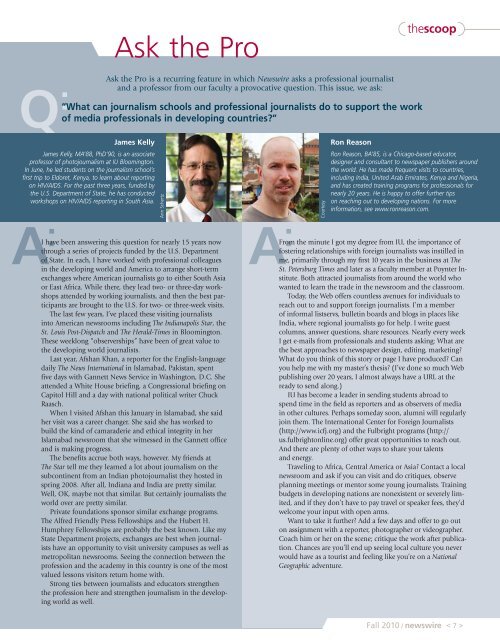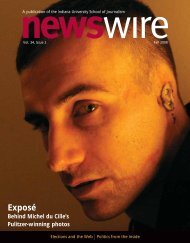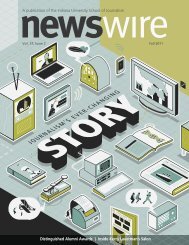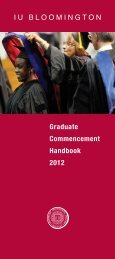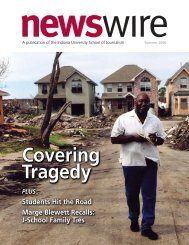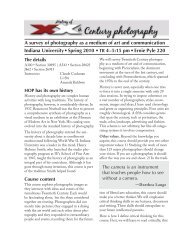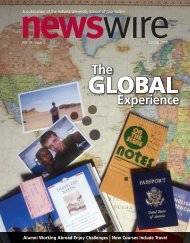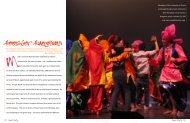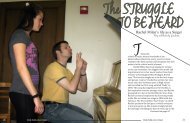The changing face of photojournalism - Indiana University School of ...
The changing face of photojournalism - Indiana University School of ...
The changing face of photojournalism - Indiana University School of ...
- No tags were found...
Create successful ePaper yourself
Turn your PDF publications into a flip-book with our unique Google optimized e-Paper software.
Ask the ProthescoopQ :Ask the Pro is a recurring feature in which Newswire asks a pr<strong>of</strong>essional journalistand a pr<strong>of</strong>essor from our faculty a provocative question. This issue, we ask:“What can journalism schools and pr<strong>of</strong>essional journalists do to support the work<strong>of</strong> media pr<strong>of</strong>essionals in developing countries?”James KellyJames Kelly, MA’88, PhD’90, is an associatepr<strong>of</strong>essor <strong>of</strong> <strong>photojournalism</strong> at IU Bloomington.In June, he led students on the journalism school’sfirst trip to Eldoret, Kenya, to learn about reportingon HIV/AIDS. For the past three years, funded bythe U.S. Department <strong>of</strong> State, he has conductedworkshops on HIV/AIDS reporting in South Asia.Ann SchertzCourtesyRon ReasonRon Reason, BA’85, is a Chicago-based educator,designer and consultant to newspaper publishers aroundthe world. He has made frequent visits to countries,including India, United Arab Emirates, Kenya and Nigeria,and has created training programs for pr<strong>of</strong>essionals fornearly 20 years. He is happy to <strong>of</strong>fer further tipson reaching out to developing nations. For moreinformation, see www.ronreason.com.A : A :I have been answering this question for nearly 15 years nowthrough a series <strong>of</strong> projects funded by the U.S. Department<strong>of</strong> State. In each, I have worked with pr<strong>of</strong>essional colleaguesin the developing world and America to arrange short-termexchanges where American journalists go to either South Asiaor East Africa. While there, they lead two- or three-day workshopsattended by working journalists, and then the best participantsare brought to the U.S. for two- or three-week visits.<strong>The</strong> last few years, I’ve placed these visiting journalistsinto American newsrooms including <strong>The</strong> <strong>Indiana</strong>polis Star, theSt. Louis Post-Dispatch and <strong>The</strong> Herald-Times in Bloomington.<strong>The</strong>se weeklong “observerships” have been <strong>of</strong> great value tothe developing world journalists.Last year, Afshan Khan, a reporter for the English-languagedaily <strong>The</strong> News International in Islamabad, Pakistan, spentfive days with Gannett News Service in Washington, D.C. Sheattended a White House briefing, a Congressional briefing onCapitol Hill and a day with national political writer ChuckRaasch.When I visited Afshan this January in Islamabad, she saidher visit was a career changer. She said she has worked tobuild the kind <strong>of</strong> camaraderie and ethical integrity in herIslamabad newsroom that she witnessed in the Gannett <strong>of</strong>ficeand is making progress.<strong>The</strong> benefits accrue both ways, however. My friends at<strong>The</strong> Star tell me they learned a lot about journalism on thesubcontinent from an Indian photojournalist they hosted inspring 2008. After all, <strong>Indiana</strong> and India are pretty similar.Well, OK, maybe not that similar. But certainly journalists theworld over are pretty similar.Private foundations sponsor similar exchange programs.<strong>The</strong> Alfred Friendly Press Fellowships and the Hubert H.Humphrey Fellowships are probably the best known. Like myState Department projects, exchanges are best when journalistshave an opportunity to visit university campuses as well asmetropolitan newsrooms. Seeing the connection between thepr<strong>of</strong>ession and the academy in this country is one <strong>of</strong> the mostvalued lessons visitors return home with.Strong ties between journalists and educators strengthenthe pr<strong>of</strong>ession here and strengthen journalism in the developingworld as well.From the minute I got my degree from IU, the importance <strong>of</strong>fostering relationships with foreign journalists was instilled inme, primarily through my first 10 years in the business at <strong>The</strong>St. Petersburg Times and later as a faculty member at Poynter Institute.Both attracted journalists from around the world whowanted to learn the trade in the newsroom and the classroom.Today, the Web <strong>of</strong>fers countless avenues for individuals toreach out to and support foreign journalists. I’m a member<strong>of</strong> informal listservs, bulletin boards and blogs in places likeIndia, where regional journalists go for help. I write guestcolumns, answer questions, share resources. Nearly every weekI get e-mails from pr<strong>of</strong>essionals and students asking: What arethe best approaches to newspaper design, editing, marketing?What do you think <strong>of</strong> this story or page I have produced? Canyou help me with my master’s thesis? (I’ve done so much Webpublishing over 20 years, I almost always have a URL at theready to send along.)IU has become a leader in sending students abroad tospend time in the field as reporters and as observers <strong>of</strong> mediain other cultures. Perhaps someday soon, alumni will regularlyjoin them. <strong>The</strong> International Center for Foreign Journalists(http://www.icfj.org) and the Fulbright programs (http://us.fulbrightonline.org) <strong>of</strong>fer great opportunities to reach out.And there are plenty <strong>of</strong> other ways to share your talentsand energy.Traveling to Africa, Central America or Asia? Contact a localnewsroom and ask if you can visit and do critiques, observeplanning meetings or mentor some young journalists. Trainingbudgets in developing nations are nonexistent or severely limited,and if they don’t have to pay travel or speaker fees, they’dwelcome your input with open arms.Want to take it further? Add a few days and <strong>of</strong>fer to go outon assignment with a reporter, photographer or videographer.Coach him or her on the scene; critique the work after publication.Chances are you’ll end up seeing local culture you neverwould have as a tourist and feeling like you’re on a NationalGeographic adventure.Fall 2010 / newswire < 7 >


